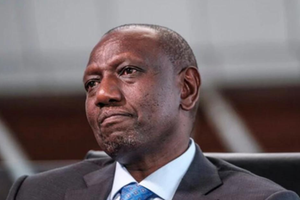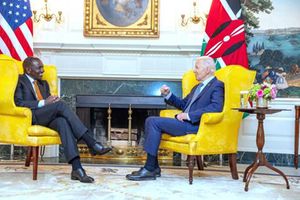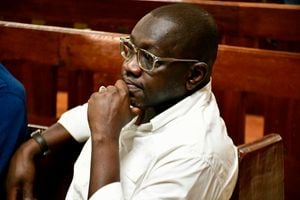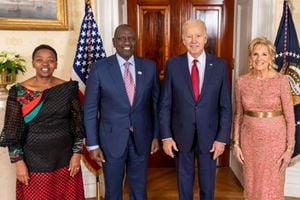
Interior and National Administration Cabinet Secretary Kithure Kindiki and Deputy Inspector General of Police Noor Gabow during a past event.
Kenyan police officers will not be going to Haiti anytime soon due to a delay in the construction of a base where they are expected to stay while on a peace mission in the gang-ravaged country, the Nation can now reveal.
Journalists, members of civil right groups and medics, are among sources in Haiti who have highlighted the crisis that awaits the Kenyan officers who will be deployed as part of the Multinational Security Support (MSS) mission to the Caribbean nation.
On May 3, a US military aircraft began flying civilian contractors to Haiti to secure equipment and supplies arriving in that country ahead of the deployment which is being funded by the United Nations (UN).
A statement by the US military’s Southern Command said that the contractors, who were being taken to Haiti, were setting up a living area.
“Additional contractors who have recently been transported are there to set up the temporary living area for the eventual arrival of the MSS mission,” the statement read.
Whereas the UN is setting up the base near Toussaint Louverture Airport for the officers to be deployed, Haiti gang members are enhancing their operational capabilities by constructing a quay nearby.
Ruthless gang
Speaking to the Nation, Mr Wethzer Piercin, a Haiti-based crime journalist said that the quay is under the management of Johnson Andre alias Izo whose reputation as a ruthless gang leader in the southern part of Port au Prince has been rising.
So bold is the 27-year-old that he has been posting images of his gang members posing with deadly firearms while singing threatening rap songs on social media platforms.
He leads a gang known as 5 Seggon which was initially known for drug trafficking but has recently become a militia-like outfit that works closely with Jimmy Cherizier, nicknamed Barbecue — a former police officer who is now the most dreaded gang leader in Haiti.
Hated and loved in equal measure, Mr Cherizier has become a unifying factor among rival gangs that did not see eye to eye before the announcement of the MSS mission in Haiti by the UN Security Council in late 2023.
Last Friday, President William Ruto, in an interview with BBC, said that the Kenyan officers will arrive in Haiti in three weeks.
It is worth noting that Dr Ruto, who recently returned from a State visit to the US, discussed the progress of the Haiti mission with his host, President Joe Biden in Washington.
Haitians carrying placards held demonstrations outside the Kenyan Embassy in America last Thursday.
The protestors accused President Ruto of being “a willing US slave and being used to cause chaos” in their country.
Kenyan Police sources told the Nation that a team led by Deputy Inspector General of Police Noor Gabow, which is already in Haiti, advised that officers should not be sent until their base is completed. Mr Gabow will be the force commander of the mission.
“What has delayed the deployment, which could have taken place last week, is the place where the officers will operate from is only 70 percent complete,” said an officer who spoke in confidence as he is not authorised to address the media.
Apart from Kenya, other countries that will be sending their officers to Haiti include; Jamaica, Grenada, Paraguay, Burundi, Nigeria and Mauritius.
However, questions have been raised over the legality of sending Kenyan police to Haiti.
Mr Ekuru Aukot, an advocate of the High Court, on Sunday told the Nation that the process used to deploy officers to Haiti is questionable.
“In fact, none of the legal questions that we raised have been answered. Let it be known that sending police to Haiti remains unconstitutional. Not even the President has the powers to go against the Constitution which is the highest law in our land,” Mr Aukot said.
Giving details of a ruling made by the court, Mr Aukot said that Justice Chacha Mwita made it clear that it was unconstitutional to deploy police officers to Haiti.
Details of peace mission
The lawyer, who is also a politician, said that if the two countries — Kenya and Haiti — reciprocated on anything, then it would have been understood if the officers were sent.
“Again, if we have an agreement on the same, then it should be gazetted. Do we have any gazette notice on an agreement between the two countries?” he posed.
Referring to immediate former Haiti Prime Minister Ariel Henry as an imposter, Mr Aukot questioned how he came to Kenya and signed a peace agreement.
“Haiti does not have a Parliament to sign a treaty and send Mr Henry to Kenya. The question remains, who sent Henry to Kenya yet we all know that he was an imposter that served as a prime minister?” he asked.
Mr Aukot said that the only person who could have signed such a deal as per the Haitian constitution was an elected head of state.
The finer details of the peace mission remain scanty as both Kenya and the US do not discuss much of what is expected in Haiti.
On the kind of weapons that the Kenyan officers will use, security experts said that the entry plan in Haiti is key.
Gang members in Haiti use automatic and semi-automatic rifles as well as higher-caliber weapons, including the M60 machine gun.
Mr George Musamali, a former officer told the Nation that the kind of weapons to be used do not matter but how the Kenyan police will operate while in Haiti is key.
He gave an example of the Kulbiyow and El Adde attacks in Somalia in which hundreds of Kenyan soldiers were killed by Al Shabaab militants.
“Do we have an entry plan? It does not matter the kind of weapon the officers will be carrying. When you study the gangs in Haiti, they are having superior weapons which are used by the US military. What plans does Kenya have?” Mr Musamali asked.
“Our officers know that they are going to deal with gangs, but in Haiti, the gangs are known as freedom fighters. They should also put that into consideration,” he added.
Human rights issues
He urged the police who will be deployed to Haiti to carry themselves with decorum and be alive to human rights issues.
Mr Musamali’s sentiments were echoed by Mr Hassan Wako who runs a security firm in Kenya. He said that the kind of weapons that the police officers will be carrying is not important.
Mr Wako said that the officers should have a good entry plan and also an understanding of the terrain in Haiti.
“The weapons they should carry comes at a later stage. The big question now is, do they know the terrain of the country and trust the people they will be working with?” He asked.
Rival gangs in Haiti are now working together. They are united in their stand, and have warned that “they are ready to fight off any enemy” who steps into their country.
Since 2021 when former Haiti president Jovenel Moise was assassinated, the security situation in the country has deteriorated rapidly.
And since January this year, more than 2,500 people have lost their lives, while tens of thousands have been displaced from their homes.
On Sunday, Mr Gedeon Jean who is the Centre for Analysis and Research in Human Rights (CARDH) boss, said that the gangs had even taken control of key police stations in Haiti.
“Some of the strategically placed police stations have been burnt down by the gangs and others are being manned by the same gangs,” he said.
A civil right group known as Movement Unforgettable Dessalines Jean Jacques (MUDJJ) this week told the Nation that former PM Henry should be arrested.
Assassination
“In 2021, a top prosecutor asked that Mr Henry shouldn’t leave the country after he was linked to the murder of Mr Moise.
“Now that he is out of office and has no influence whatsoever, he should be arrested and taken to court,” Mr Eliphete Joseph said.
A prosecutor had moved to court and asked that Mr Henry explains his links with Mr Joseph Felix Badio, the main suspect in Mr Moise’s murder. The prosecutor alleged that the two men had multiple phone calls just hours after the assassination.
MUDJJ also said that the current US ambassador to Haiti, Dennis Hankins, was persona non-grata in Haiti. The group accuses the US of interfering in Haiti’s affairs.
The former US ambassador to Haiti Daniel Foote resigned from office in 2021, saying that the Haitian government had failed to provide enough security for its citizens.
“Haitians need immediate assistance to restore the government’s ability to neutralise gangs and restore order through the national police,” part of his resignation letter read.
Doctors without Borders based in Haiti said that they have run out of medicine. They have threatened to stop providing services.
[email protected]@gmail.com
Tomorrow: Read about why Haitians do not want the UN mission in their country.









